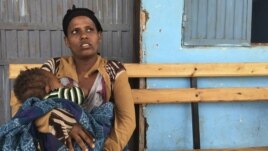12 August, 2019
A hospital in Kenya has set up a breast milk bank to help save the lives of newborn babies.
The project is a first of its kind for East Africa and only the second on the African continent. Organizers say it is providing donated milk to babies in need.

A woman breastfeeds her child at the Halo health post in Halo village, a drought-stricken area in Oromia region in Ethiopia, Jan. 31, 2016.
The milk bank was set up at Nairobi's Pumwani Maternity Hospital. It opened in March.
Mary Auma is a mother who recently visited the hospital. She spoke with VOA reporters.
Auma's baby was born a month early. Auma herself has been sick and has not been able to breastfeed her baby, as suggested by the World Health Organization. The WHO says babies born early have a greater chance of survival when given breast milk instead of formula.
Auma says she would rather go to the hospital milk bank than use baby formula sold in the store. Auma said the bank has helped feed her baby while she recovers from her sickness.
Kenya's Ministry of Health launched the milk bank plan in partnership with PATH, a U.S.-based nonprofit health organization. The project's goal is to address the problem of newborn deaths. Currently, Nairobi leads the country in the number of newborn deaths.
In addition to assisting mothers who cannot breastfeed, the milk bank also helps feed babies who were born too early and those with low birth weights.
Fifty-eight babies have been helped by the milk bank so far. Hospital workers say the mothers are leaving with healthier newborns. "Though the project is still very young, we have noted that the neonatal mortality rate is going down," said Keziah Njau, the head nurse at the hospital.
Dr. Elizabeth Kimani-Murage is a senior research scientist at Nairobi's African Population and Health Research Center. She helped lead the push for the Nairobi milk bank. She says research has proven that very small or sick babies who receive human donor milk have a higher survival rate than those who are fed only formula.
Mary Ndinda is one of the donors. She told VOA she is happy to provide her milk to help save young lives.
She said another reason she decided to donate was because she had a very large supply of breast milk days after giving birth to her own baby.
Officials in Kenya say they hope to set up other milk banks across the country in the future.
I'm Bryan Lynn.
Sarah Kimani reported this story for VOA News. Bryan Lynn adapted the story for Learning English. Ashley Thompson was the editor.
We want to hear from you. Write to us in the Comments section, and visit 51VOA.COM.
__________________________________________________
Words in This Story
formula – n. a liquid food mixture fed to babies instead of mother's milk
neonatal – adj. of or for newborn babies
mortality – n. the number of deaths within a particular society within a specific period of time